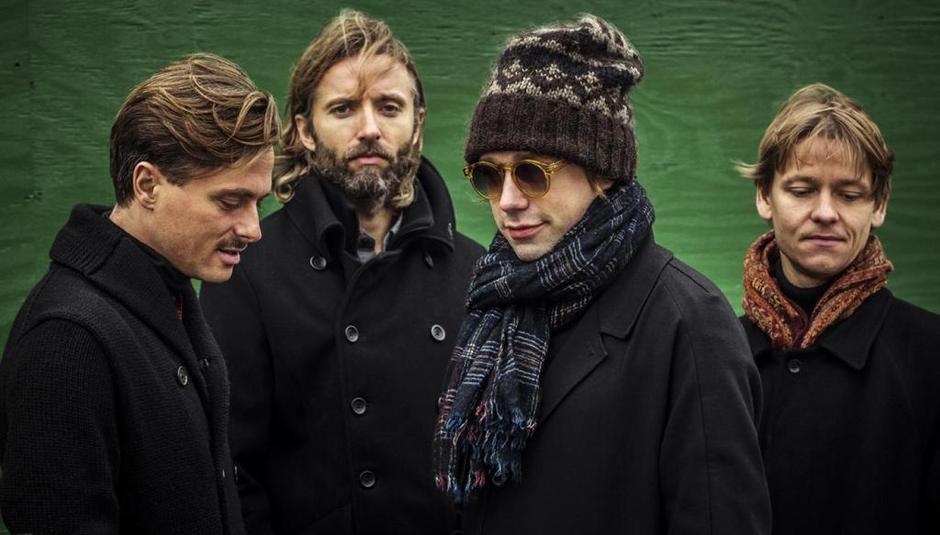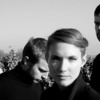On Monday, DiS will be streaming Mew's new album, today we share our conversation with their Jonas Bjerre.
Mew are a band that, to be frank, should be able to consider themselves career musicians, if any band dare do that. So unique is the Danish band’s blend of melancholy pop with a rock (almost metal tinged) centre-pin that they stand in glorious isolation. With five albums released and their latest +- due for imminent deployment, it’s a fanfare of melodies that inspires with its confident positivity.
This is an album by a band reacquainted, and feeling more at ease than ever within their particular sonic world. Sure they’ll never ride a Zeitgeist, but Zeitgeists are generally derivatives of derivatives, so who wants them? Having the opportunity to talk to frontman Jonas Bjerre about +- brings into focus that being s musician these days is an endlessly varying series of repetitions and that happiness in your own creativity is all you can aspire to, the rest might come with it.
DiS: You guys don’t rush your output, with normally at least three years between albums, but +- took six years, why the long gestation period?
Jonas Bjerre: We were going for the world record.
DiS: So each time you put out an album, do you feel like you’re entering a different industry?
JB: It is very different each time, it’s a strange dynamic in a band like ours that takes so long in between records. We spend a long time writing and a long time recording, tucked away in our own little world. In the meantime everything else is progressing without you and then when you step out in the light you see a different landscape. But the general feeling of playing music and the way that people respond to our music, I think it’s pretty much the same, just a different playing field each time.
DiS: So have you noticed any differences in the way you approach each album’s release, promotionally?
JB: There’s more and more emphasis on social media, more now than ever before, and there will probably be even more next time. It’s something that’s almost like a parallel universe that continues on and it supports us to be present in people’s real lives, as we go on tour. It’s communication, it’s keeping people up to date on what’s happening and also helps us remind people that we’re there, you need to keep reminding people. So I guess that change is there, but also the way that people listen to things has changed, you know, streaming on phones. A lot of people don’t really listen on stereos anymore, but that’s really nothing that we can seize on, we can only really acknowledge that and respect that. I don’t think it’s a bad thing, it’s just different.
DiS: But can we assume that you’re interested in sound quality? +- has a lot more studio editing involved than your previous albums, so is it’s fair to say that for you high fidelity creation is important?
JB: Sonic are very important to us and they’re very important to me when I listen to music. I enjoy it when you feel as though you’re stepping into music. I listen to a lot of music on headphones; I listen a lot when I’m walking. You can think because it’s on headphones that you might not really care, but I listen on the move a lot, I enjoy being in movement and I enjoy listening to music at home, so I enjoy being saturated in sound. Sometimes it can take a whole album before you’re even starting to get into the music so for me, I enjoy the album format.
DiS: Your enjoyment of music seems to be reflected in your output as your albums are themselves immersive, did you approach +- differently in any way?
JB: When we started out we were still only three people. On the last record we did (No More Stories…), I feel like with the last album we did didn’t really feel like a rock album. I’m really happy that we made that album, it was the album we wanted to make at the time, but there was a lot of turmoil when we began this time because we very quickly fell into the same methods that we’d used on the last album and that didn’t feel satisfactory. Mostly because we’d already done it and we didn’t want to do the same thing again. And I think we were kind of missing the core ‘band’ feeling, which was something that our producer (Michael Beinhorn) picked up on very quickly when he came over. He suggested, ‘why don’t you call the old bass player (Johan Wohlert)?’ because the last album Michael did with us, Johan was still part of the band. I felt that was the push we needed to call him up and very quickly it became a band again.
It’s amazing to think that we had played without him for a number of years because we only did one album without him, but it was a totally different feeling. For example touring that album. So Johan’s return was and is great, and really influenced the sound a lot.
DiS: So it was a full-on reunion?
JB: Yes, Johan was in a different part of his life and we’d always remained friends, there was never animosity between us, but yes. It was very sentimental in some ways. When we started playing again there was that ‘ah, this is what it used to be like,’ feeling. Also there are great feelings on tour; a special energy. I think in many ways, we would never have formed this band if we hadn’t been the four people we were at the beginning. I think we all would have done very different things if it had not happened when it did, and if we’d tried it at another time. I think the framework of being in this band is the four of us.
DiS: The album has a sense of elation to it, although that could be a projection knowing of Johan’s return. Do you feel that +- is your most optimistic album yet?
JB: To me, to put a word on it, it’s quite extrovert. It’s celebratory and a very direct album, especially compared to the last album we did which was really, more, atmospheric. It didn’t have so much of then drive. It was also… it’s hard for me to be objective about it to be honest because it had taken us a long time to make it, so you get used to how it sounds as it’s made. I think Johan was a big influence on this album, both in terms of his participation and also the feeling of playing. We’ve known each other since we were six, we’ve grown up together and, at least when we were growing up, we didn’t play in other bands. We were very insular. We developed our own language, that’s part of what makes the band what it is.
DiS: If the formation of Mew was an insular pathway, how has the experience of becoming ‘worldly’, with many years of touring impacted your music over time? Do you now live in a smaller or a bigger world?
JB: It’s true that in some ways the world really does actually feel smaller, and not in least because of the internet. There are amazing things about it although in some ways I miss the feeling of having to discover some record in a dusty old store somewhere that nobody else knew. But that’s really a very romantic way of looking at it. In general I feel very privileged, I really do. Really really grateful that we can still do this and that we can still travel around.
In some ways as well I feel like we’ve only just begun because there are many places that we haven‘t toured, we still haven’t played Australia ever, we’ve toured very little in many places and we’re hoping to play new places it this time, to travel everywhere. I really like travel, it’s very inspiring and it was also really great to play shows in the midst of recording, it’s the first time, to my recollection, that we’ve ever did that.
There’s something about presenting songs, even if they’re not quite finished, presenting them to the audience because you’re listening with the audience’s ears almost. For example you know a part of a song that you’re a little bit ashamed of, that’s almost how I feel about it. You can live in denial and be ‘no, this is cool… it’s got to be cool’ but then you play it to an audience you know if it’s cool, or not cool, you can just tell. They don’t even have to boo you, you can just feel it. I feel that really helped and I wished we could do that with the whole album, but then in a way that would be a shame because we want some of the stuff to be new for the audience.
DiS: Another new approach within +- is the writing and guitar contribution of Bloc Party’s Russell Lissack on the track ‘My Complications.’ It still sounds 100% you guys, but there’s a nice added melodic punk-snarl in the playing. What was the expectation when you guys decided to collaborate?
JB: I don’t know, it was really kind of an experiment and it started very slowly. We did three days of writing and then we came back and recorded, we did two songs actually but the other one we just couldn’t get it to fit right. I think as a result the record feels a bit more open, it feels more inviting in a way than stuff we’ve done before. We’ve admired Russell’s playing, toured with Bloc Party and we admire that his contributions are always for the song, they strengthen the song. He’s talented, and I’ve been playing less and less guitar - my playing is always rhythm, putting the chords out - because Bo (Madsen, lead guitarist)’s playing is special. I think it was great for Bo to have someone much better than me to play up against. That was a great experience for all of us.
DiS: Whilst the track is anything but the current algorithm that is commercial co-writing these days, what are your thoughts on the science slash art?
JB: I think when song-writing becomes a craft, more than an artistic expression, that’s really when I feel it becomes generic. A lot of current pop is based on the same formula, that’s not the case when we write with Russell. But co-writing is a very powerful thing when it’s done right.
DiS: And how does it feel to be Mew right now? What are you expecting once the album’s out?
JB: Right now a lot of touring is being planned, which I look forward to. Right now we’re at home just doing some promotion, mainly radio sessions and stuff like that. I’m excited about playing shows, it’s funny how different the weird little cycle is; the writing is different, the studio is different and you’re always a little bit nervous when you’re about put out something that you’ve worked on for so long, but I’m super happy how people are reacting online to the singles. It’s really feels like a big, I don’t want to say relief because that’s not the right word, but it feels like a validation. We’re a band that gets caught up in the detail and there can be some fairly tense moments in the recording process, so it’s great to finish it and get it out.
+- is released on 27th April through Play It Again Sam. Check back on Monday for a pre-release stream of the album.






















